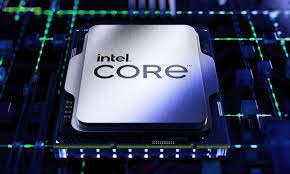Intel Core I7 of theRaptor Lake Series
This article will analyze the Intel Core I7-14700 as a premium options offering a good balance between performance and energy eficiency
2/19/20253 min read


Intel Core i7 of the Raptor Lake Series: Technical Analysis, Comparison, and Use Cases
The Intel Core i7 of the Raptor Lake series stands out as a premium option for users seeking a balance between high performance and energy efficiency. Designed for advanced users and professionals, this processor combines raw power with innovative technologies. In this article, we will explore the technical specifications of the Core i7-14700, compare it with previous generations, the Core i9, and the Core i5, as well as its direct competition from AMD. Additionally, we will analyze its performance in gaming, video editing, and productivity tasks.
The Core i7-14700 features an advanced hybrid design that combines performance cores (P-Cores) optimized for intensive tasks and efficient cores (E-Cores) designed for lighter multitasking. This model also includes technologies such as Intel Thread Director, which intelligently distributes workloads between cores based on priority.
Comparison: Core i7 vs Previous Generations and Competitors
Against Alder Lake (12th Generation)
The jump from Alder Lake to Raptor Lake is significant:
Increased number of E-Cores (from 8 to 12), improving multitasking performance.
Larger L3 cache (from 30 MB to 33 MB).
Higher turbo frequencies (+200 MHz on P-Cores and +300 MHz on E-Cores).
In terms of performance, the i7-14700 offers up to a 15% improvement in multithreaded tasks and a modest increase of about 5% in single-threaded applications, according to independent benchmarks.
Against AMD Ryzen 7 7700X
The AMD Ryzen 7 7700X is a direct competitor to the i7-14700:
Both processors have similar core counts but differ in architecture.
The Ryzen offers advantages in energy efficiency due to its 5 nm manufacturing process.
In gaming scenarios, the i7 typically outperforms the Ryzen by about 2% to 5% in certain titles.
Against Intel Core i9-14900K
The Core i9 is a more powerful option than the Core i7:
Higher core and thread count (24/32 vs. 20/28).
Higher turbo frequency (up to 6.0 GHz vs. 5.4 GHz).
Larger L3 cache (36 MB vs. 33 MB).
For users needing maximum performance in multithreaded tasks or extreme gaming scenarios, the Core i9 is justified despite its higher price point.
Against Intel Core i5-13600K
The difference between the Core i5 and Core i7 is notable:
The Core i5 has only 14 cores and 20 threads, limiting its multithreading capabilities.
The turbo frequency of the Core i5 peaks at 5.1 GHz, significantly lower than that of the Core i7.
The maximum TDP of the Core i5 is lower (181 W vs. 219 W), making it more efficient but less powerful.
Performance in Benchmarks
Gaming
The Core i7 excels in gaming thanks to its high turbo frequencies:
In AAA titles like Cyberpunk 2077 and Call of Duty: Modern Warfare II, it maintains consistently high frame rates.
At Full HD resolution, it outperforms the Ryzen by about 10%-12%.
At higher resolutions like 4K, differences narrow due to GPU limitations.
Productivity
In tasks such as rendering or video editing:
Blender: The Core i7 completes projects approximately 15% faster than its predecessor.
Adobe Premiere Pro: It processes complex projects around 20% quicker than the Core i5.
Energy Consumption
The base TDP of the i7 is similar to that of the i5 (65 W), but under maximum load it can reach up to 219 W, necessitating robust cooling solutions.
While the price of the Core i7 is notably higher than that of the Core i5, it remains competitive against Ryzen offerings.
Recommended Use Cases
Gaming
The Core i7 is ideal for gamers looking to play AAA titles at high frame rates while also streaming or multitasking lightly.
Video Editing and Rendering
With its high multithreaded performance and larger L3 cache, this processor is perfect for professional content creators using software like Adobe Premiere Pro or Blender.
Advanced Productivity
For advanced users running multiple applications simultaneously or working with complex simulations, the Core i7 provides a smooth experience without bottlenecks.
Conclusion: Is the Intel Core i7 Worth It?
Choosing between the Intel Core i7 and other processors depends on budget and specific needs:
If you seek a balanced option for gaming with good productivity performance occasionally, the i5 suffices.
If you require additional power for intensive multitasking or professional content creation, the i7-14700 justifies its higher price.
For those needing maximum capability in extreme gaming or heavy workloads, consider stepping up to the i9.
In summary, the Intel Core i7 represents an excellent choice within Raptor Lake's offerings, providing compatibility with modern technologies such as DDR5 and PCIe Gen 5 while outperforming both previous generations and direct competitors in key scenarios.
